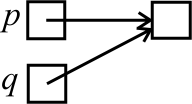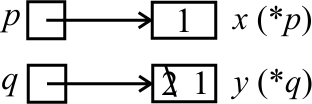|
If x is a variable then &x is the memory address where x is stored. So int v; int* p = &v;makes variable p hold the address of variable v. Observe that, for any type T:
For example, if x has type int then &x has type int*. |
*p
If p is a pointer then *p is the variable
to which p points. For example,
int v = 1; int* p = &v; *p = 2;ends with v = 2, since *p is the same a v, as shown in the following diagram. For any type T:
For example, pointer p declared above has type int*. So *p has type int. |
q = p;
If you set pointer variable q equal to pointer variable p,
then you are making q hold the same memory address as p.
So q and p point to the same place, as in the following
diagram.
It does not make q point to p. |
*q = *p;
Remember that *p is the variable to which p points.
Assignment *q = *p sets the variable
to which q points
equal to the variable to which p points. That is
not at all the same as assignment q = p.
For example, after
int x = 1, y = 2; int* p = &x int* q = &y; *q = *p;variable y holds 1, since *p is the same as x and *q is the same as y, as illustrated: 
|